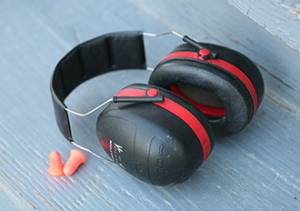Guest Blog from Farm Safety For Just Kids

Hazardous levels of noise are produced by many things on the farm, including grain dryers, tractors, combines, livestock, chainsaws, and firearms. Any noise that leaves you with ringing in the ears or you are in a noisy location and you have to raise your voice to be heard, the noise is too loud!
Protect your hearing by doing the following:
- Reduce sound levels – When selecting new equipment, ask about sound levels and pick the quietest option.
- Perform routine equipment maintenance – For example, fixing mufflers on engines, lubricating bearings, and replacing worn parts will reduce noise levels and improve farming operations.
- Isolate yourself from noise – Working in motorized equipment equipped with cabs or enclosures will reduce noise exposure.
- Use personal protective equipment – Since purchasing newer, quieter equipment is not always an option, use hearing protection when working in noisy settings. The earmuff style offers the best protection and is easy to use. Expandable ear plugs are the next best option but these require proper insertion to be effective: roll them up, insert into the ear, and hold in place while they expand to fill the ear canal.
- Mark “High Noise Zones” – anywhere there is risk of excessive noise exposure. Have a set of earmuffs or earplugs in or near every high noise setting on the farm.
- Choose the highest Noise Reduction Rating (NRR) – This is usually between 15 and 30 decibels. Chose the hearing protection with the highest NRR value.
- Limit daily exposure duration – Reducing the amount of time you are exposed to noise can limit its harmful effects.
Check out the Great Plains Center For Agriculture Health for more information about preventing hearing loss among our nation’s farmers and agriculture workers.
